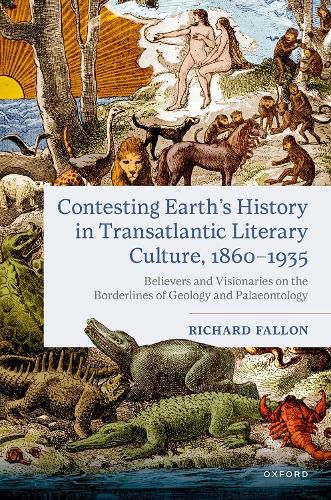Contesting Earth's History in Transatlantic Literary Culture, 1860-1935
Richard Fallon

Contesting Earth’s History in Transatlantic Literary Culture, 1860-1935
Richard Fallon
By the mid-nineteenth century, geologists and palaeontologists had reconstructed an authoritative narrative of Earth's deep history, from the planet's molten origins to the rise of humanity. Many figures in transatlantic science across subsequent decades, however, had problems with this narrative: it was too secular, inhuman, and evolutionary, or controlled too exclusively by elite scientists. Speaking from palaeoscience's unevenly professionalized and controversy-racked borders, Christian fundamentalists, charismatic psychics, and respected scholars alike voiced their objections. Until now, no study has brought their work together for detailed comparative analysis.Spanning from the 1860s to the interwar decades, Contesting Earth's History examines the fascinating stories of five significant examples of fringe or 'borderline' palaeoscience: old- and young-earth creationism, hollow-earth theory, clairvoyant time-travel, and sunken-continent catastrophism. Innovatively combining methods from literary studies with the history of science, this book attends not just to the conceptual content of these strange sciences, but also to their proponents' communication of truth claims through diverse genres ranging from the scientific textbook and the technical monograph to the lost-world romance and the epic poem. By paying close attention to the hitherto overlooked textual forms and literary strategies of these works of 'pseudoscience', this volume throws into relief the variant conceptions of audience, evidence, and method that jostled and competed in wider scientific culture during this period. It also demonstrates that, for all their diversity, authors of borderline palaeoscience shared the desire to shift the balance of power, creating textual spaces where exclusive hierarchies of scientific expertise could be levelled away.These conjurors of lost worlds often captivated wide audiences and many of their bizarre, astonishing, and iconoclastic ideas remain with us to this day. Some even inspired early science fiction by the likes of H. P. Lovecraft and Edgar Rice Burroughs. Hijacking geologists' and palaeontologists' longstanding effort at making the prehistoric past visible, authors on the borderlines of palaeoscience asserted their right to scientific authority and encouraged readers to gaze into time's abyss with bold new eyes.
Order online and we’ll ship when available (19 June 2025)
Our stock data is updated periodically, and availability may change throughout the day for in-demand items. Please call the relevant shop for the most current stock information. Prices are subject to change without notice.
Sign in or become a Readings Member to add this title to a wishlist.


